Adventures with A Beggar in Jerusalem
“Don't be afraid to come closer. The beggar will do you no harm, he will cast no spell over you. Do come near.”
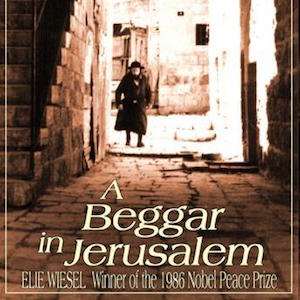
The reader is beckoned closer, to a tale of memory, of fear, of hope and of clashing realities embodied by the spirit of the beggars of Jerusalem.
“Do his eyes disturb you? They are not his and he doesn't know it. His lips? They move, yes, as they are repeating tales heard or lived a day before a century before: he no longer remembers. For him, you see, time has no meaning.” p11
Elie Wiesel’s stories, throughout his more than 60 published works in the course of his lifetime, encompassed two worlds: that of today, and that of a world destroyed which he, as its witness, felt responsible for introducing, sharing, protecting through the written word. In a Beggar in Jerusalem, his sixth book written in , is clearly an example of Wiesel’s continued movement between the past and the present in his own life.
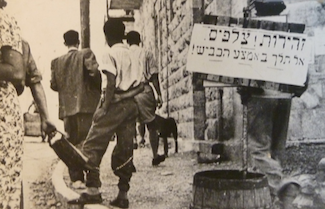
Here, he migrates back and forth between the memories of suffering and loss, imagines the Jewish town and life that has vanished and yet remains in the spirits and stories of departed souls, and the reality of life in the streets of the holy city of Jerusalem and what it became in the hours immediately after the Six-Day War.
When the battle began, Elie Wiesel rushed to Israel. "I went to Jerusalem because I had to go somewhere, I had to leave the present and bring it back to the past. You see, the man who came to Jerusalem then came as a beggar, a madman, not believing his eyes and ears, and above all, his memory."
Wiesel himself said that in this book he attempted to show "what cannot be shown, to explain what is not to be explained, to recapture an experience that cannot be relived." If that is at all possible, Wiesel has achieved it, showing the effects of the Holocaust, explaining the dreams of the dreamers, and portraying scenes of a war torn holy city that has captured and held the souls of Jews throughout time.
Through the recollections of a survivor-turned-soldier, the ramblings of beggars, and the anecdotes of madmen, the reader is given a tour of what ties Jewish history with the present and the future. For those marked for death, solitude is a distinction. For those destined to continue life, it is a myriad of moments, memories and emotions that drive us forward while always reminding us from whence we came.
Once the logic of the writing and voice are absorbed, it comes clear as both a metaphorical and literal story of the struggle of the Jews in Israel at the beginning of their nation. It is easy to forget the almost primal nature of their struggle for statehood, the outright state of war in which they had to operate for many years, and which in some ways we have never escaped.
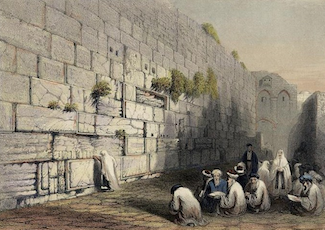
But Wiesel succeeds in delivering a message from the past to a victorious Israel: that a people "cured of obsessions and complexes, relieved of mystery and burdens," is a delusion. Nothing has changed. “I cling to you to become one with you, only to rise to the surface again, alone, expelled from time, not from the tale. Thrust into the future, I feel myself overcome with pity; despite what you may think, the end is not a new beginning.”
Weaving together myth and mystery, parable and paradox, Wiesel beckons the reader on a spiritual journey back and forth in time, always returning to Jerusalem. Tears, prayers, fathers, Games, songs all part of the Jewish ammunition that enabled our victory in the Six-Day War as told by the Beggars of Jerusalem.
Elie Wiesel has always had the uncanny ability to compassionately bring to life the horrific history that the Jewish people have suffered. His personal accounts and his novels return time and again to the mysteries of the Holocaust and the impact it has had on its survivors and the world in general. His novels are always lyrical in nature and disjointed in structure, moving between time and place with little distinction. "A Beggar in Jerusalem" may be the most unstructured novel that Wiesel has written, for it is a tale of a beggar who does not know any longer what is real and what is imaginary.

Recommended for you:
READING ISRAEL
Get started Reading Israel today!
About the Author





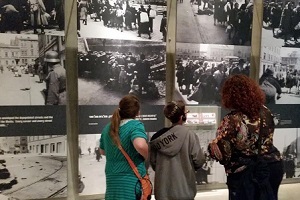
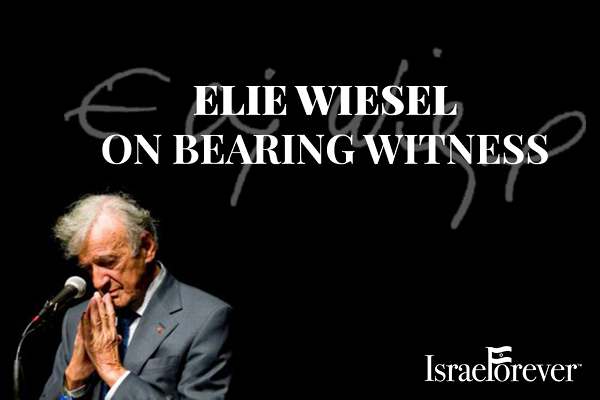




Leave a Comment on Israel Forever